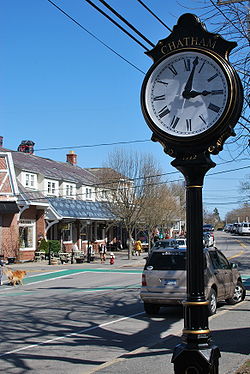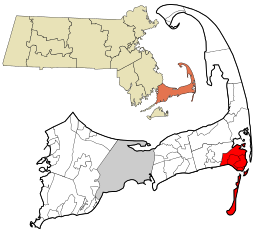South Chatham, Massachusetts
| Chatham, Massachusetts | ||
|---|---|---|
| Town | ||

Downtown Chatham, April 2010
|
||
|
||
 Location in Barnstable County and the state of Massachusetts. |
||
| Coordinates: 41°40′55″N 69°57′37″W / 41.68194°N 69.96028°WCoordinates: 41°40′55″N 69°57′37″W / 41.68194°N 69.96028°W | ||
| Country | United States | |
| State | Massachusetts | |
| County | Barnstable | |
| Settled | 1665 | |
| Incorporated | 1712 | |
| Government | ||
| • Type | Open town meeting | |
| Area | ||
| • Total | 24.4 sq mi (63.2 km2) | |
| • Land | 16.1 sq mi (41.8 km2) | |
| • Water | 8.3 sq mi (21.4 km2) | |
| Elevation | 46 ft (14 m) | |
| Population (2010) | ||
| • Total | 6,125 | |
| • Density | 380/sq mi (146.6/km2) | |
| Time zone | Eastern (UTC-5) | |
| • Summer (DST) | Eastern (UTC-4) | |
| ZIP code | 02633 | |
| Area code(s) | 508 / 774 | |
| FIPS code | 25-12995 | |
| GNIS feature ID | 0618250 | |
| Website | www |
|
Chatham is a town in Barnstable County, Massachusetts, United States, Barnstable County being coextensive with Cape Cod. First settled by the English in 1664, the township was originally called Monomoit based on the indigenous population's term for the region. The population was 6,125 at the 2010 census. Chatham is home to the Monomoy National Wildlife Refuge, located on Monomoy Island,
For geographic and demographic information on specific parts of the town of Chatham, please see the articles on Chatham (CDP) and West Chatham.
Native American tribes who lived in the area before European colonization included the Nauset, specifically the Manomoy or Monomoy people. The expansive lands over which they roamed were known to them as Manamoyik or Monomoit. Explorer Samuel de Champlain landed here in October 1606 at a place he christened "Port Fortuné", where he contacted (and skirmished with) the Nauset. Twelve years later another group of Europeans gave it the name "Sutcliffe's Inlets". Neither name stuck, and the location was not permanently occupied by Europeans until English settlers reached Monomoit in 1664. The town was incorporated on 11 June 1712, at which point it was renamed after Chatham, Kent, England. Its territory expanded with the annexation of Strong Island and its vicinity on 7 February 1797.
Located at the "elbow" of Cape Cod, the community became a shipping, fishing, and whaling center. Chatham's early prosperity would leave it with a considerable number of 18th century buildings, whose charm helped it develop into a popular summer resort.
Chatham is home to the Chatham Lighthouse, which was established by President Thomas Jefferson in 1808 to protect the ships circling the Cape. The 1808 towers were replaced in 1841 by twin brick towers that were eventually lost to erosion. The pair were rebuilt in 1877 out of cast iron across the street from its original location, where the light is today. The northern of the two was moved to Eastham to become the Nauset Light in 1923, when the northern tower was declared surplus. Today, the keeper's house is home to a Coast Guard station which patrols the waters of the Atlantic and Nantucket Sound from Wellfleet to West Yarmouth. The first reforesting project in America took place on Great Hill in 1821 when Selectmen had pine trees and beach grass planted to prevent erosion and to keep sand from blowing over the village.
...
Wikipedia

